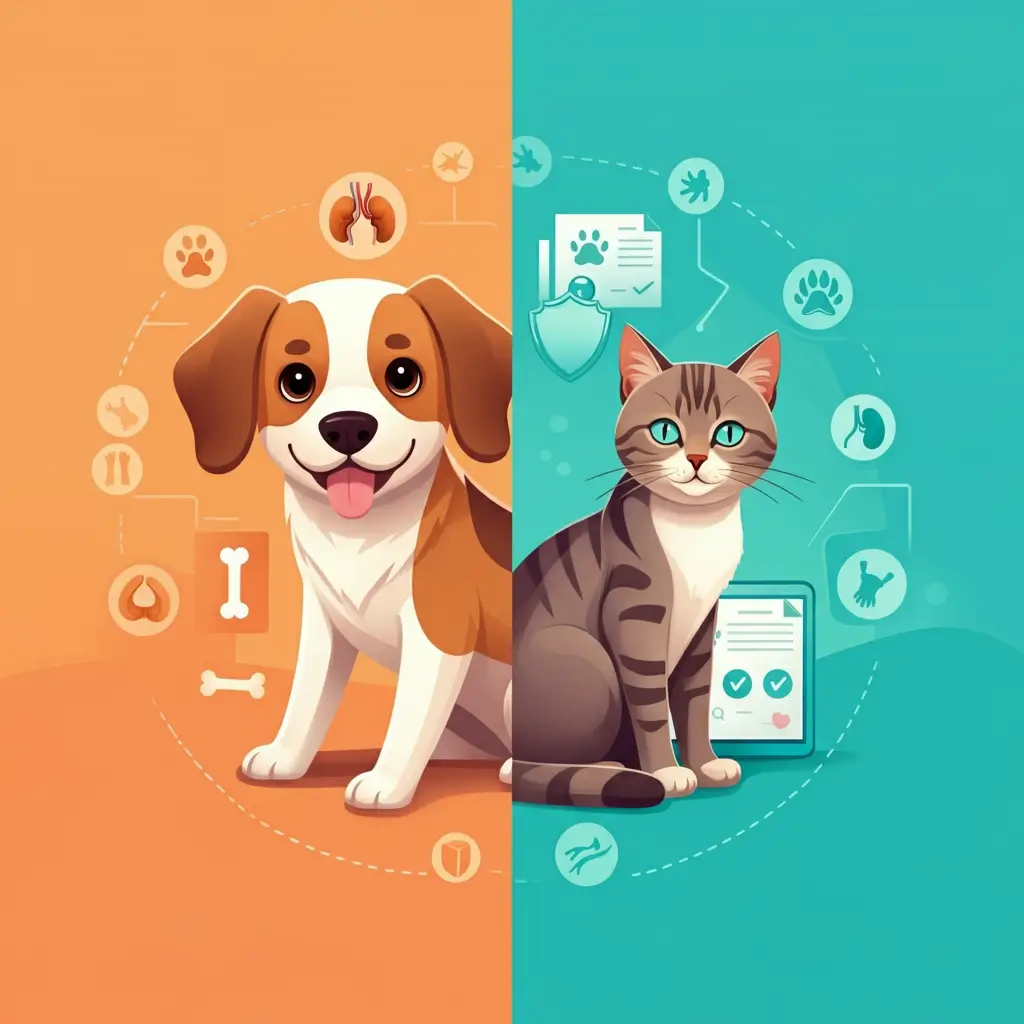Pet insurance is quickly becoming a must-have for pet owners, offering peace of mind and financial protection against unexpected and often costly veterinary bills. With advancements in veterinary care and the increasing costs of treatments, more pet owners are turning to insurance to ensure their furry companions receive the care they need without hesitation. But if you’re a pet owner with dogs, cats, or both, you might be wondering: does it matter which type of pet you insure? The short answer is yes. Dogs and cats have distinct health profiles, risk factors, and insurance requirements, leading to differences in costs, coverage options, and what to prioritize when choosing a policy.
By the end of this in-depth blog, you’ll have a clear understanding of the key differences between pet insurance for dogs and cats, the factors influencing the costs, and how to select the best policy for your furry family member. We’ll also provide real-life examples, expert insights, and tips to help you make an informed decision. Whether you’re insuring a playful pup, an independent cat, or both, this guide has you covered.
How Health Differences Impact Insurance for Dogs vs. Cats
Dogs and cats have very different health profiles, which directly affects the structure and costs of their insurance policies.
Dogs
Dogs are naturally more active, curious, and often, more prone to injuries and illnesses. Their playful and sometimes reckless behavior increases their likelihood of accidents or health issues. Common health problems in dogs include:
- Joint Problems (e.g., hip dysplasia, arthritis): These conditions are more common in larger breeds like Golden Retrievers and German Shepherds. Treatments, including surgery and ongoing therapy, can range from $1,500 to $5,000.
- Skin Allergies: Many breeds experience chronic skin conditions, requiring consistent treatments that can cost between $200 and $500 annually. In severe cases, costs can climb even higher.
- Gastrointestinal Issues: Dogs are famous for eating things they shouldn’t, which often results in stomach troubles. Emergency veterinary visits for gastrointestinal blockages or poisoning can cost anywhere from $800 to $3,000.
Cats
Cats, while more independent and cautious than dogs, are not immune to health challenges. They’re less likely to suffer from injuries but are prone to certain illnesses, many of which can be chronic. Common conditions in cats include:
- Urinary Tract Problems: These are among the most frequent health concerns in cats, especially males. The average treatment costs for urinary blockages or infections range from $400 to $1,200 but can be higher in severe cases.
- Dental Disease: Cats can develop dental issues early, with treatment costs typically ranging from $300 to $1,000. Left untreated, dental disease can lead to further health complications.
- Feline Diabetes: Older or overweight cats are particularly at risk for diabetes, and managing the condition can cost between $1,000 and $2,000 annually, including insulin and regular checkups.
These health differences mean dog insurance plans are generally more expensive than those for cats. According to the North American Pet Health Insurance Association (NAPHIA), dog insurance costs an average of $594 per year, while cat insurance averages $342 annually. This price gap reflects the higher risk and treatment costs associated with dogs.
Breed-Specific Issues and Their Impact on Coverage
Breed plays a significant role in determining insurance costs and coverage options. Certain breeds are more predisposed to health conditions, and insurers factor these risks into the cost of premiums.
Dogs
For dogs, certain breeds have specific health risks:
- Breeds like Bulldogs and Pugs are prone to brachycephalic airway syndrome, a condition that affects breathing.
- Large breeds like Saint Bernards and Great Danes are more likely to develop heart and joint problems.
These breed-specific risks often mean higher premiums for some dog owners, as treatments for these conditions can be extensive and costly.
Cats
Similarly, some cat breeds are more susceptible to genetic conditions:
- Maine Coons and Persians are prone to heart disease and polycystic kidney disease.
- Purebred cats are generally at a higher risk for genetic issues, which insurers take into account when setting policy terms and premiums.
When insuring your pet, always review whether preexisting conditions and breed-predisposed issues are covered, as some policies exclude these altogether.
Types of Pet Insurance Policies
Pet insurance, whether for dogs or cats, typically falls into three categories. Choosing the right type of policy is essential for meeting your pet’s specific needs.
- Accident-Only
Accident-only policies cover unexpected injuries, such as fractures, ingesting foreign objects, or wounds from accidents. While these plans are typically more affordable, they don’t cover illnesses or chronic conditions. They’re a good choice if your pet is generally healthy but prone to accidents. - Accident and Illness
This is the most popular option among pet owners. It covers everything from accidents to illnesses, including breed-specific conditions and chronic health issues like arthritis or diabetes. If you’re looking for comprehensive protection, this type of plan is ideal. - Comprehensive Plans
Comprehensive plans go beyond accident and illness coverage to include wellness care, such as routine exams, vaccines, dental cleanings, and preventative treatments. While they’re the most expensive option, they’re perfect for pet owners who want all-inclusive coverage. For example, Nationwide Pet Insurance offers robust comprehensive plans that include wellness care, while Healthy Paws Pet Insurance focuses on accident and illness plans with no payout caps.
Key Factors When Choosing Between Dog and Cat Insurance
Before picking a policy, consider these key factors to ensure it aligns with your pet’s needs and your budget:
- Coverage Needs: Evaluate your pet’s specific risks. Dogs may need accident-heavy coverage, while cats might benefit more from plans focused on chronic illnesses.
- Budget: Dog insurance tends to cost more than cat insurance, so weigh the cost of premiums against the potential cost of vet bills.
- Lifetime Costs: Cats often live longer than dogs, which means you could be paying premiums for several additional years. Look for plans like Trupanion, which has no annual limits, to manage long-term costs.
- Preventative Care: Some policies, such as those from Embrace Pet Insurance, offer add-ons for routine care like vaccinations and wellness exams. These are especially valuable for first-time pet owners.
- Lifestyle and Environment: Consider your pet’s lifestyle. A high-energy dog that visits dog parks frequently may need a plan with robust accident coverage, while an indoor-only cat might require illness-focused insurance.
Expert Insights and Real-Life Examples
Veterinarians often emphasize the value of pet insurance. Dr. Stephanie Carter, who specializes in small animals, explains, “Pet insurance can make a huge difference when unexpected health issues arise. It allows owners to focus on their pet’s care without the stress of financial limitations. This is especially important for dogs, who tend to experience more injuries and illnesses.”
Take the case of Misty, a 4-year-old Golden Retriever. Misty injured her leg while playing fetch and required orthopedic surgery that cost $4,500. Fortunately, her owners had a Healthy Paws comprehensive policy, which reimbursed them for 80% of the expenses.
Contrast this with Bella, a 5-year-old domestic shorthair cat who developed a urinary blockage. Her vet bills totaled $1,000, but her Trupanion plan covered everything beyond her $200 deductible.
These examples highlight how the right insurance can provide critical financial and emotional support.
Why Pet Insurance Is Worth It
Whether you’re a dog person, a cat person, or both, pet insurance offers invaluable protection. It provides financial security when unforeseen health issues arise, allowing you to focus on giving your pet the care they deserve without added stress.
For peace of mind, consider starting with a free quote from trusted providers like Healthy Paws, Trupanion, Nationwide, or Embrace. Your pets will thank you for it—and so will your wallet.







